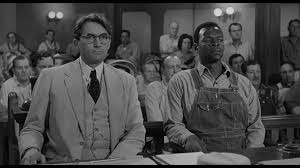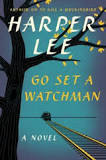One would have to have been on a desert island or locked away from all media not to have been aware of the rumor of, announcement of discovery of, forthcoming publication of, publication of, and ensuing reaction to Harper Lee's Go Set a Watchman, the book she wrote before the beloved classic To Kill a Mockingbird.
I didn't leap to acquire a copy. Not because I didn't want my memories of Atticus ruined, as many people put it. Not because this was said to be a much weaker piece of work. It was just one of those things I thought I'd get around to eventually.
The thing is, I'd never been in love with TKAM -- I read it over fifty years ago and somehow never felt the need to read it again. (I went through a very long period of resistance to most American and particularly most Southern fiction, spending my time with English writers for the most part. I did get over this prejudice eventually, thanks in great part to Lee Smith's novels.)
I probably saw the movie -- but again, have no strong memory of it. So much about TKAM has become a part of our group consciousness that I have a hard time distinguishing between what I read or saw and what I've absorbed by osmosis.
But I thought I should read this new (old) book. At the very least it would be interesting to see the first attempt of this renowned novelist. First, however, I had to read TKAM again.
And, oh! how glad I am that I did. It spoke to me so clearly of a time that I remember -- well, more or less -- TKAM is set in 1935 and I wasn't around till 1943. But things change slowly in the South and everything about the book-- good and bad -- had the ring of familiarity. My maternal grandparents were from Alabama and I visited kin there on multiple occasions. (Aunt Mamie had a cook who could have stood in for Calpurnia. ) And Troy, Alabama wasn't much different from Maycomb.
Neither was Tampa, Florida in the Forties and Fifties. It was a city but also a collection of small towns. In our particular small town of South Tampa, southern politesse reigned. The ladies visiting, the rules, the expectations . . . now I find all of it a quaint memory but I suspect that when the book came out in 1960 (my first year in college and the beginning of my growing disaffection with the life I'd been brought up to lead,) I suspect it just annoyed me. Too close, too familiar.
Now, with time and distance, I am enchanted with all of it -- the familiar voices and folkways, the inquisitive, intelligent Scout, the wise and upright Atticus, Jem, Dill, Calpurnia and the many eccentric characters who inhabit Maycomb. It's a wonderful book and it kept me reading till 2 in the morning.
And when I awakened, I was on fire to go back to these characters -- flawed and imperfect as Watchman was rumored to be. So, with the instant gratification of my Kindle, I was back in Maycomb with the grown-up Scout -- now Jean Louise.
Oh, my -- and this was familiar too, beginning with the train ride and the 'roomette' (that was how my grandmother and I got to Troy for those visits.) I remember the consternation in the white community over Civil Rights, the fear that everything was about to change. (My Alabama relatives were said to be 'strong for George Wallace,")
I didn't find it surprising that the saintly Atticus had the attitudes that he did. It seemed absolutely believable. And it didn't diminish his role in TKAM. He was still a moral force.
WATCHMAN has its flaws -- at times the grown up Jean Louise is nowhere near as likable as Scout. And some of the dialogue turns into speechifying at times. Still, I read it straight through, finishing in the wee hours of the morning, just as I had the previous day with MOCKINGBIRD.
You can see where Lee mined WATCHMAN for chunks of description or narrative to recycle in TKAM - the description of Aunt Alexandra, for example, or the story of Maycomb's founding. And there are are bits that would have benefited from a close editing. But it's still a terrific story.
For lovers of MOCKINGBIRD, there are lots of flashbacks to that time period. The range of eccentric characters is there. Uncle Jack is particularly well done. And it was interesting to me to see what had happened to the characters from TKAM.
I thought WATCHMAN was a much harder hitting book than MOCKINGBIRD -- which makes me wonder if that's part of why it was not published. Too many home truths perhaps.
In 1960 when TKAM was published, it allowed white readers to feel good about themselves, to identify with Atticus in standing up for the underdog. (THE HELP did the same.) But WATCHMAN doesn't produce that same good feeling -- at best, it's a wary accommodation of the changes in society. The white folks of WATCHMAN have gone from benevolent in their care of the 'good coloreds' to uneasy and suspicious of them all.
And, alas, as I read, I kept thinking how relevant this old/new book is to today's not- exactly- post-racial society.
The scene where the grown-up Jean Louise asks Calpurnia -- the now retired housekeeper who raised her -- if she had ever loved them ( Jem and Scout and Atticus) was especially poignant. (I'll leave it to you to discover Calpurnia's answer.)
I was reminded of overhearing a relative complaining about the cold reception she received from the adult children of her ailing housekeeper/cook when she visited the old woman in the (Negro) hospital.
"When I think of all we did for her! These young Coloreds have just gotten above themselves!"
I suspect those children resented the fact that the white family had seen far more of their mother than they ever had. For years their mother had cooked and cleaned five (it might have been six) days a week and served after-school snacks and meals, including Thanksgiving and Christmas, to the white family. Her children got what little was left of her.
As I warned, my response to both of these novels is quite personal. I hear the voices; I know the people. I remember the times with a combination of nostalgia and loathing. But I loved both books.





9 comments:
Glad to hear your take on it. I was one who didn't want my illusion of Atticus tarnished. Sounds like yours wasn't at all.
I have also been hesitant to read the prequel which is a sequel. I guess I will do it eventually.
Thank you for your thoughtful read of the book. Our book club (Laurie King's online book club) is considering reading it, having read To Kill a Mockingbird not long ago, and people have been back and forth about doing so. One of the major reasons for not wanting to read it seems to be that people don't want to see Atticus turned into a racist. I think it's more the same reason many white people don't want to talk about or recognize racism in our society. It's easy to condemn the Confederate flag waving, cross burning people in white hoods as racists and, by doing so, by default one becomes Not Racist because one is not a Confederate flag waving, etc. Racism is an insidious and deeply ingrained part of our society, and almost every single one of us is complicit in it, as was Atticus. Atticus as portrayed in TKaM let us feel good about ourselves as white people. I suspect the Atticus in TSaW may not have the same effect.
Vicki, once again I felt very connected to much that you describe in this post. As you know, we are very close to the same age, and have made some similar decisions in our lives away from the path that our upbringing might have indicated for us.
I have never read To Kill a Mockingbird, and have only seen bits and pieces of the filmed version on television over the years. My own parents certainly did not approve of the novel. As years passed by, I began to feel as if I knew too much about the book's plot and characters to actually be able to give the novel a fresh read.
Now, you've actually got me wondering if perhaps I will make visit to the library stacks and borrow Mockingbird. Sometimes I also wonder if my lifetime experiences and reflections might allow me to write a book of my own. So, so much material always swirling around in my head.
Thanks for this post. xo
Anvil Cloud -- it's not written as a sequel though is IS, chronologically. It's a curiosity, a first book, long unpublished that uses the same characters as the classic.
Karen -- to me, Atticus is what he is. A fiercely moral man who will put his life and reputation on the line to defend a man unjustly accused. He is also a product of his time -- paternalistic and very politely racist in the face of the Civil Rights movement. I would think your book club would enjoy WATCHMAN -- so much, so very much to discuss.
Frances -- I really recommend you read TKAM.
boy oh boy.....that was excellent.
You know my feelings about the book already. I honestly think Harper Lee never intended that it be published after she was very wisely advised to take another look and turn it into what became "To Kill a Mockingbird."
We both lived in the same times in the South and I'm not sure I want to read it. For some reason I never got around to reading TKAM, probably because it felt too much like home - a time in life I wanted to get away from because of so much of the injustice in those times made me sad and angry. I was essentially raised by two mothers, my maternal mother and a lovely black "girl," who for all practical purposes might as well been my mother because we were together so much and grew so close. I'm not sure I have enough tears left in me for either book, although I really enjoyed your take on it Vicki.
Sam
Thank you, Vicki.
I've submitted a reserve request at my marvelous library. When my name does come up on the list and I take the book home and read it, I am sure that I'll be seinding you a long email. (While I was at it, I also submitted a reserve request for Watchman.)
xo
Post a Comment